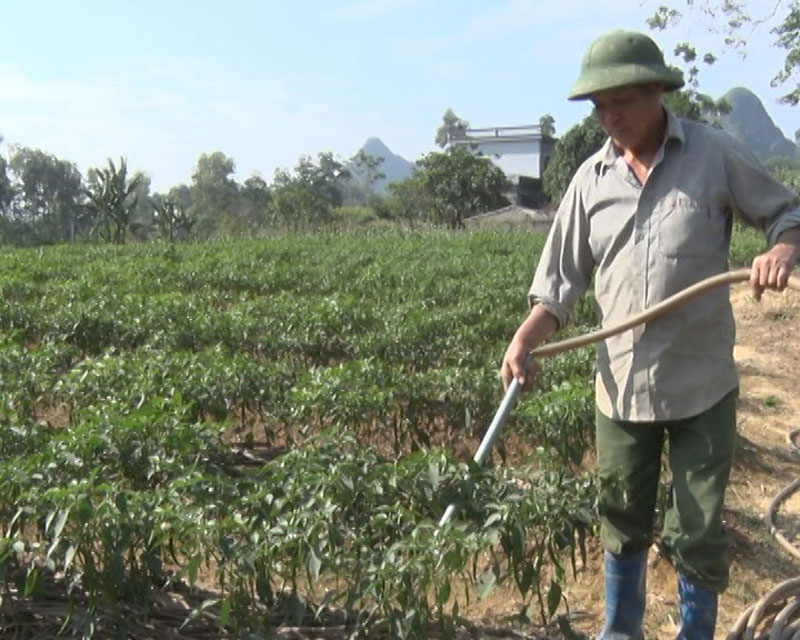
HBO – Agriculture production toward value chain is one of the breakthroughs in restructuring the agriculture sector today.
Lac Thuy district has helped local farmers by connecting them with enterprises, instead of letting them struggle themselves in the market.
Enterprises are responsible for providing materials, technical assistance and buying agricultural products of local farmers, while farmers only focus on production. The connectivity models help to ensure product quality and origin tracing.
In August 2016, An Lac commune signed a contract with Vietnam Chilli Co. Ltd. on growing hybrid chilli for export on 3.5 hectares of land. The pilot project involved 19 farming households in An Phu and Loc Thanh hamlets. They used chilli variety 7 (a Chinese hybrid chilly), which produces fruits in two months of growth. This was the first time local farmers had grown chilli crop. They followed standardised cultivating procedure, thus resulting in high yield and quality with an average productivity of between 1.2 tonnes and 1.5 tonnes of chilli per Vietnamese acre (360 sq.m). The Vietnam Chilli Company bought all chilli produced by local farmers at prices range from 5,000 VND to 10,000 VND per kg, much lucrative than rice and maize. Farmers could earn between 200 million VND - 250 million VND per hectare of chilli.
Following the successful pilot model, the chilli growing area was expanded to 20 hectares with the involvement of eight out of 15 communes in the Lac Thuy. The district signed contract with the Mien Bac Green Agriculture JSC in Kim Dong, Ha Nam province.
The business-linked model on chilli growing for export An Lac commune, Lac Thuy district has high economic value.
Two other value chain-based projects are implemented in Lac Thuy district, including chicken raising and vegetable cultivation. The project on raising 20,000 local chicken in Dong Tam and Phu Thanh communes, involving 20 households, meanwhile the other on concentrated safe vegetable production is carried out in Dong Tam, Co Nghia and Lac Long communes.
Attention was also paid on luring investment in the district’s rural areas. A number of firms invested in safe vegetable production and herbal plant cultivation in late 2016 and early 2017 under the connectivity model toward chain value, including the Lac Thuy clean agriculture company, Vietnam Chilli Company, and Sinh Loc Vocational training Company.
Besides, other companies such as the Mien Bac Green Agriculture JSC and Vietnam Chilli Company want to participate in connectivity models on chilli and pumpkin production for export.
Quach Tat Liem, Chairman of the Lac Thuy district People’s Committee, said the district targets to raise local income per capita to over 34.5 million VND at the end of 2017.
Therefore, the district has instructed its communes to actively shift economic and agricultural production structure toward high-economic goods production, while promoting human resources training; building appropriate production models, and developing connectivity models.
Incentives should be offered to encourage the connection among managers, farmers, firms and consumers in tandem with protecting the environment, establish cooperatives and farms, invest in agriculture and rural development, form large-scale fields, and use agricultural machinery to reduce post-harvest loss.
In addition, focus should be also put on providing vocational training for rural labourers, promoting industrialisation in rural areas, creating jobs and shift rural labour structure.
Dao Village’s honey – a product certified with a 3-star OCOP (One Commune One Product) rating by Thong Nhat Agricultural Cooperative in Dao Village (Hoa Binh City) – is highly regarded by consumers for its quality, richness, and variety in packaging. The distinctively sweet taste of Dao Village’s honey leaves a lasting impression on anyone who has tried it.
In alignment with Project No. 07-DA/TU, issued by the Hoa Binh provincial Party Committee on November 1, 2021, Lac Thuy district has actively promoted investment and supported the sustainable development of its industrial and handicraft sectors during the 2021–2025 period. Alongside this, the district has remained committed to preserving and revitalising traditional craft villages.
Located in the northern part of Lac Thuy district, with a temperate climate and fertile soil, Phu Thanh commune has great potential and advantages in growing tea. The long-standing experience, combined with strict adherence to organic farming practices in the tea gardens, ensures that the dried tea products from Phu Thanh and Lac Thuy as a whole are sold out immediately upon production, providing a stable and prosperous life for the local people.
Amid efforts to streamline the administrative apparatus, Hoa Binh province has intensified measures to address challenges in land clearance, resettlement support, and infrastructure investment, aiming to speed up the progress of key projects.
Hoa Binh province has posted an unprecedented economic growth rate of 12.76% in the first quarter of 2025, marking its highest quarterly performance to date and positioning it as the second fastest-growing locality in the country, trailing only Bac Giang province.
Under current regulations, products in the One Commune – One Product (OCOP) programme that are rated three stars or higher must undergo re-evaluation every three months. However, in reality, some of these products fail to consistently meet the required standards, raising concerns about the sustainability of their OCOP certification. This underscores the urgent need for producers to enhance product quality and gradually develop their OCOP products into strong, marketable brands.



